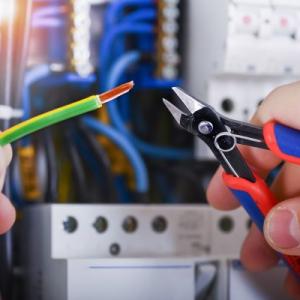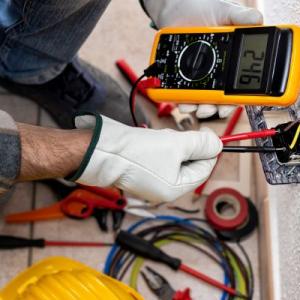Wiring Installation: Payson
Wiring Installation in Payson
Get help with Wiring Installation in Payson. Fill out the form above and we will connect you with local Payson pros. Getting a professional wiring installation can offer numerous advantages for your home or business. By engaging the services of experienced electricians, you can ensure that your electrical system is installed correctly and safely. This helps to minimize the risk of electrical faults, such as short circuits or power outages, which can be both inconvenient and potentially dangerous. Additionally, a proper wiring installation can enhance the overall efficiency and performance of your electrical system, leading to reduced energy consumption and lower utility bills. With expertly installed wiring, you can have peace of mind knowing that your electrical infrastructure is reliable and up to code, providing a solid foundation for all your power needs.Wiring Installation FAQ
Q: What Are The Key Considerations When Planning A Wiring Installation?
Answer: The key considerations when planning a wiring installation include determining the electrical load, selecting the appropriate wiring materials, ensuring compliance with building codes and safety standards, planning for future expansion or upgrades, and hiring a qualified electrician for installation.Q: How Can I Ensure The Safety Of A Wiring Installation?
Answer: To ensure the safety of a wiring installation, here are some key steps you can follow: 1. Hire a qualified electrician: It's important to have a professional electrician handle the installation, as they have the necessary knowledge and experience to do the job safely. 2. Use quality materials: Make sure to use high-quality wiring, cables, and components that meet safety standards. This helps minimize the risk of electrical faults and accidents. 3. Plan and design carefully: Proper planning and design are crucial to ensure that the wiring installation meets your specific needs and is done in a safe and efficient manner. Consider factors such as load capacity, circuit protection, and proper grounding. 4. Follow electrical codes and regulations: Familiarize yourself with local electrical codes and regulations to ensure compliance. These codes are in place to protect against hazards and ensure safe installations. 5. Regular maintenance and inspections: Schedule regular maintenance checks and inspections to identify any potential issues or hazards. This helps prevent electrical failures and ensures the ongoing safety of the wiring installation. Remember, electrical work can be dangerous, so it's always best to consult with a professional electrician for any wiring installation or modification to ensure safety.Q: What Are The Different Types Of Wiring Systems Available For Installation?
Answer: The different types of wiring systems available for installation include: 1. Conduit Wiring System: This system uses metal or plastic pipes to protect and route electrical wires. 2. Surface Wiring System: It involves running wires on the surface of walls, ceilings, or floors, usually concealed with decorative covers. 3. Concealed Wiring System: This system hides electrical wires behind walls, ceilings, or floors, providing a clean and aesthetically pleasing appearance. 4. Cleat Wiring System: It utilizes wooden or plastic cleats to secure electrical wires to walls or ceilings. 5. Casing and Capping Wiring System: It involves placing electrical wires in plastic or metal casings and covering them with capping to protect and conceal the wires. 6. Batten Wiring System: This system uses insulated wooden battens to support and protect electrical wires. 7. Lead Sheathed Wiring System: It employs lead sheathing to protect electrical cables from moisture, corrosion, and mechanical damage. 8. Conductor Bar System: It uses insulated conductors mounted on a busbar to distribute electricity in industrial settings. These are some of the commonly used wiring systems, each with its own advantages and suitability for different applications.Q: What Are The Common Challenges Or Issues That May Arise During A Wiring Installation And How Can They Be Addressed?
Answer: Common challenges or issues that may arise during a wiring installation include: 1. Incorrect wire sizing or gauge selection: This can lead to overheating, electrical failures, and safety hazards. It is crucial to follow appropriate wire sizing guidelines and consult electrical codes. 2. Poor wire routing or organization: Improper wire routing can cause confusion, difficulty in troubleshooting, and potential damage to the wiring. Proper planning, labeling, and organization of wires can help address this issue. 3. Inadequate grounding: Inadequate or improper grounding can result in electrical shocks, equipment malfunction, and interference with other electronic devices. It is important to ensure proper grounding techniques are followed and tested. 4. Insufficient access points or outlets: Insufficient outlets can lead to overloaded circuits, inconvenience, and potential fire hazards. Adequate planning and installation of enough access points and outlets can help address this issue. 5. Compatibility issues: Incompatibility between different components, such as switches, outlets, or connectors, can cause functionality problems or even damage to the wiring system. Ensuring compatibility and using standardized components can help mitigate this challenge. To address these challenges, it is essential to hire a qualified electrician or professional with expertise in wiring installations. Following electrical codes and guidelines, proper planning, thorough testing, and regular maintenance are key to ensuring a successful and safe wiring installation.Wiring installation refers to the process of setting up electrical wiring systems in residential, commercial, and industrial buildings. It involves the careful placement and connection of wires, cables, and other components to ensure the safe and efficient distribution of electricity throughout the structure. Skilled professionals, such as electricians, are responsible for carrying out wiring installation, adhering to local building codes and safety regulations. This essential task involves planning the routing of wires, selecting appropriate types and sizes of cables, and properly grounding the system. Wiring installation is crucial for powering lighting fixtures, appliances, heating and cooling systems, and other electrical devices within a building.


